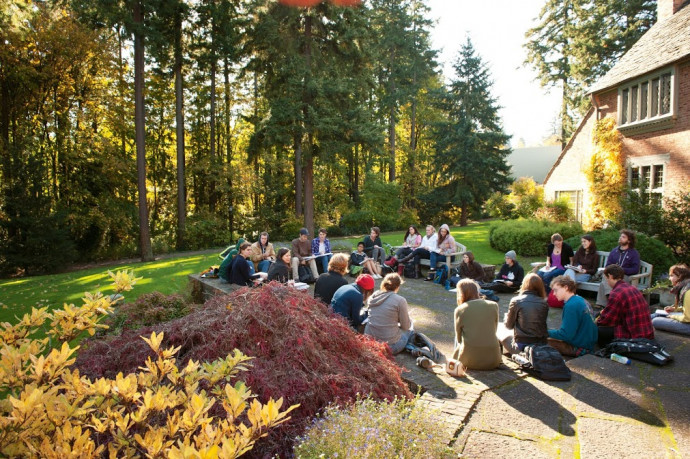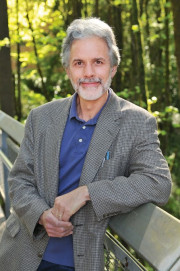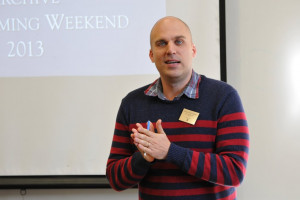Word Play
Through poetry and prose, new generations discover the power of creative writing at Lewis & Clark.
by Ben Waterhouse BA ’06

Most colleges don’t have any. Some have one … maybe two. However, the College of Arts and Sciences at Lewis & Clark boasts no fewer than three poets who were named either a finalist or a winner of the National Book Award, one of the most prestigious honors in American letters. William Stafford won in 1963 for Traveling Through the Dark, Vern Rutsala was a finalist in 2005 for The Moment’s Equation, and Mary Szybist won in 2013 for Incarnadine.

Development of Course Sequences
Faculty in the English department agree that much of the credit for the growth of creative writing in the College of Arts and Sciences belongs to Associate Professor Mary Szybist, who has taught at Lewis & Clark since 2004. At the beginning of her tenure, there was no sequence of prerequisites for poetry or fiction writing courses, and the department offered only two courses in each subject. “You could take Introduction to Poetry or Introduction to the Short Story and an intermediate-level workshop, but the intro course was not a prerequisite; you could just jump right into one or the other,” Szybist says. “So we made the 200-level a prerequisite for the 300-level and that meant that only students who were really prepared would take that intermediate course. The level of conversation went up immensely.”
In 2006, the department started offering advanced 400-level workshops in poetry and fiction writing, creating a three-course track for aspiring writers. “I think it’s made a tremendous difference in really allowing exploration and development,” Szybist says.

The expanded sequence of writing courses has proven exceedingly popular with students, as has a class on writing creative nonfiction taught by Cheston Knapp, managing editor of the literary magazine Tin House, and previously taught for many years by Susan Kirschner. “We are experiencing an ever-increasing number of students who come into our department—as majors and nonmajors—who are interested in creative writing,” Fosso says. Toutonghi is more emphatic: “It’s astonishing,” he says. “The demand is giant. I routinely have a 25-person waitlist for a 25-person class.”
In Stafford’s Footsteps
It is perhaps ironic that creative writing courses should be so popular in a department strongly influenced by the legacy of William Stafford—“the department that Stafford built,” in Fosso’s phrasing. Although Stafford, who taught at Lewis & Clark from 1948 to 1978, is celebrated for his poetry and his teaching, he never taught poetry writing at the college, opting to teach only literature courses. (The recently deceased Vern Rutsala, who served at the college from 1961 to 2006, did teach poetry writing; see his obituary on page 43.)
“There’s something about that that I actually love,” Szybist says. “I like teaching in an English department that doesn’t separate creative writing from literature.”
I like teaching in an English department that doesn’t separate creative writing from literature.Mary Szybist, Associate Professor of English
Jerry Harp, assistant professor with term of English, who teaches some of the department’s poetry writing courses, says creative writing instruction at Lewis & Clark is grounded in literary study. “Much of what we do is teach close reading. We do not teach as if there were some strong demarcation that separates creative writing from literary study.”
Stafford’s writing nonetheless plays an important role in creative writing instruction at the college, where faculty have made extensive use of the William Stafford Archives. In observation of the centennial of Stafford’s birth, Toutonghi is teaching one of his courses in a room within the library’s special collections. “I’m teaching directly out of the archives,” Toutonghi says. We’re using Stafford’s letters. We’re using his daily writing. He had terrible handwriting, which you become fond of by the end of the semester. It’s amazing to see a writer at work.” Szybist uses Stafford’s drafts as writing prompts. “I often have students select a poem by Stafford and then look up his previous drafts,” she says. “It adds a different dimension to look up the material copy. A frequent assignment is to write an essay about Stafford’s revision process—how he went from an early draft to a final draft, what choices he made. I ask students how they can take those lessons back to their own work.”
Liberal Inspirations
While the college’s creative writing courses are based in literary study, they attract many students who are not English majors. In Toutonghi’s current senior fiction writing seminar, only 3 of 13 students are English majors; the rest come from fields as diverse as international affairs, computer science, and economics. In Szybist’s current senior poetry writing seminar, only half the students are English majors.
Harp says the diversity of students’ academic pursuits benefits their writing. “We want people with quite varied backgrounds to be creating literature,” he says. “One of the things I like is to get students to bring the technical vocabulary from other pursuits, whether it’s chemistry or physics or philosophy, into their poetry.”
We want people with quite varied backgrounds to be creating literature. One of the things I like is to get students to bring the technical vocabulary from other pursuits, whether it’s chemistry or physics or philosophy, into their poetry.Jerry Harp, Assistant Professor With Term of English
Indeed, many Lewis & Clark alumni say they found inspiration for their writing outside of creative writing courses. Eric Lundgren BA ’00, whose first book, the existentialist detective novel The Facades, was published in September 2013, cites courses on literary theory and modernist literature as influential, and says, “The musical education I got at Lewis & Clark, mainly from [James W. Rogers Professor of Music] Aaron Beck, echoes through the book.”
Nick Lantz BA ’03, whose third collection of poems, How to Dance as the Roof Caves In, was published in March 2014, took courses in poetry, fiction, and playwriting as a student, but majored in religious studies. “I try to be intellectually omnivorous in my writing— a little philosophy, a little science, a little history, a little literature,” he says. “And that’s what my transcript looked like, that’s what I was encouraged to do—try out different disciplines, different fields.”
Peter Ames Carlin BA ’85 is an accomplished journalist and the author of recent biographies of musicians Brian Wilson, Paul McCartney, and Bruce Springsteen. Although Carlin took some creative writing courses as a student, he says he found his voice as a writer in a class on African American literature with John Callahan, Morgan S. Odell Professor of Humanities—an experience he calls “the most important class I ever took in terms of writing and in some ways in terms of my whole career.”
“I remember Callahan once brought in a Nina Simone song called, ‘I Wish I Knew How It Would Feel to Be Free,’ and played it to us chorus by chorus and pointed out the ways she sang that same line throughout the song,” Carlin says. “People were really having an incredibly difficult time wrapping their heads around it, but he was so fired up about it, and there was something hypnotic about his enthusiasm and the power of his belief.”
The moment stuck with Carlin through the rest of the semester, and inspired his final assignment: an essay on folk character Stagger Lee. “I remember getting into the groove one night, scribbling along in a notebook, as you did in those days, and just pounded out this thing. And I remember thinking, I don’t know if this is a college paper, but I sure feel like this is exactly what I wanted to say… . It was a big connection to me, like, ‘This is how you write about art.’ When you interpret something, this is how you should write about it—with the kind of passion that Callahan had for Nina Simone.”
Taking the Next Step
As demand for Lewis & Clark’s creative writing tracks has grown, so too has the number of alumni pursuing master of fine arts degrees in poetry and fiction. Recent graduates have attended some of the most respected graduate writing programs in the country, including those at the University of Iowa, Washington University in St. Louis, Purdue University, Columbia University, New York University, the University of Washington, Portland State University, Oregon State University, San Francisco State University, and the University of Montana.
“We’ve placed people in very good programs where they’ve received good funding and good scholarships with fellowships and teaching opportunities,” Szybist says.
-
Northwest Writing Institute
Since its inception in 1986 the Northwest Writing Institute (NWI) has provided a home to diverse writing initiatives from all three schools at Lewis & Clark. Beginning with its first venture, the Oregon Writing Project, which strives to improve writing instruction in Oregon schools through teacher seminars, the institute has championed programs that pursue writing across cultures and economic strata.
For nearly 30 years, the institute’s programs have reached far beyond Lewis & Clark. In 1987, NWI helped launch the Fishtrap Writers Gathering, a weeklong series of workshops, readings, and discussions held at Wallowa Lake each summer. In 1988, NWI established the Oregon Folk Arts Program, a hub for statewide folklife activities now based at the University of Oregon.
Kim Stafford, director of the Northwest Writing Institute, says NWI “tries to be ambidextrous by combining academic and personal writing,” and that, though its programs have changed through the life of the institute, they have shared a common philosophy.
“NWI has been a kind of incubator for a broad range of courses and projects founded on what can be learned, deepened, and shared by writing,” Stafford says. “What has remained central to our work is the practice of inquiry-based writing in service to cultural understanding. This combination of personal and cultural interests has brought the power of personal story to an investigation of regional, ethnic, and world cultures.”
Stafford, a respected figure in Northwest literary circles who has taught writing at Lewis & Clark since 1979, has published many collections of essays and poems, and edited a number of collections of work by his father, William Stafford. (The NWI also administered the William Stafford Center until the William Stafford archives were donated to Watzek Library by the Stafford family in 2008, and has helped to convene several symposia on the work of the late poet.)
“The Northwest Writing Institute originally grew out of a single, college-wide question: What is this college doing with the practice of writing?” Stafford says. The question led to the convening of a committee of staff from the College of Arts and Science’s English, history, and rhetoric and media studies departments, writing center, and Watzek Library; the Lewis & Clark Law School’s legal writing program; and the Graduate School of Education and Counseling’s teacher education program. The institute’s initial work, which emerged from those conversations, was a series of faculty writing workshops and support of Basic Inquiry, the College of Arts and Science’s first-year course at the time.
Today, the Northwest Writing Institute is housed at the Graduate School of Education and Counseling, and focuses on providing writing classes for enrolled graduate students and workshops for writers from the Portland community, while continuing to support writing programs at the college’s other schools. Current community offerings include courses on imaginative writing, digital storytelling, and writing about diverse cultural stories.
“When NWI began in the 1980s, there was an impetus across campus toward writing to learn and writing across the curriculum,” Stafford says. “The legacy of the Northwest Writing Institute has been to sustain that broad aspiration that writing is not an esoteric craft practiced by the few, but a universal opportunity for all learners.”
Riley Johnson BA ’11 is in his second year at the Writers’ Workshop at the University of Iowa, widely regarded as the nation’s top graduate program in creative writing. “Everybody who was pursuing writing with any degree of seriousness knew and talked about Iowa, the way Munchkins know and talk about Oz. I took for granted that in a dream world I’d be accepted here. Two years in, I still feel as if I live in that dream world,” Johnson says. “What enabled me to apply to Iowa (and, let’s face it, to get in) can be summed up pretty neatly in five words: Pauls Toutonghi and Mary Szybist… . Mary and Pauls are both excellent teachers, expansive and patient, insistent without indulging too often in prescription.” Catherine Polityllo BA ’11 will enter the Writers’ Workshop this fall.
Some alumni have leapt from graduate writing programs to entrepreneurial endeavors. In the final year of his MFA program at the University of Colorado at Boulder, Mark Rockswold BA ’06 cofounded SpringGun Press, which publishes an online journal, print books, and digital experiments in poetry and prose. “We’re interested in innovative work that’s in dialogue with contemporary and historic artistic traditions and dedicated to publishing new voices and writers in particular,” he says. Another recent alumna, Natalie Garyet BA ’10, is managing editor of Tavern Books, a nonprofit poetry publisher in Portland.
After completing her degree at the University of Montana, Laurel Nakanishi BA ’06 received a Fulbright Scholarship to perform research for a book of poetry. Wanting to be more involved with the community in which she found herself, she cofounded Nica Arts, a nonprofit organization that offers workshops in writing and theatre to children in rural Nicaraguan communities. In February 2014, Nica Arts presented a children’s poetry festival to more than 600 participants.
“I never would have thought to do a master’s degree in writing, but Mary’s confidence in me helped me eventually see myself as a writer,” Nakanishi says. “Mary has been a mentor and advocate for the last eight years, and I’m continuously inspired by her passion for teaching, her careful observations of the world around, her ability to see through politics yet deal diplomatically with them, and her generous spirit.”
Two Lewis & Clark alumni, Corey Van Landingham BA ’08 and Rosalie Moffett BA ’08, received Stegner Fellowships to Stanford University in 2013. The Stegner Fellowship, which provides recipients with a $26,000 annual stipend, health insurance, and weekly intensive workshops for two years, is awarded to only five poets each year. It is unusual enough for two fellows to come from the same undergraduate college, but Moffett and Van Landingham also attended the same graduate writing program at Purdue University.
“Corey and I, despite sharing a couple of classes, really didn’t know each other at Lewis & Clark,” Moffett says, “which is strange to think, now that it seems like we’re cosmically linked.”
Both Moffett and Van Landingham have received other prestigious awards: Moffett won the 2012 Discovery award for emerging poets, sponsored by Boston Review, and Van Landingham received the 2012 Ohio State University Press/The Journal Award in Poetry. The award recognizes one unpublished manuscript per year, which is then printed by the press. Van Landingham’s debut collection, Antidote, was published in October 2013.
“When I came to Lewis & Clark, I had the hopes of being an international affairs major. My first semester, though, after taking History of the Lyric Poem with Jerry [Harp], I switched my major immediately to English,” Van Landingham says. “Having Jerry and Mary treat me and my writing seriously was such a gift, and it didn’t hurt that I have deep respect for both of them and their work.”
The feeling is mutual: In the spring semester of 2014, Harp assigned Van Landingham’s Antidote to his Intermediate Poetry class.
Ben Waterhouse BA ’06 is a freelance writer and editor and communications coordinator for Oregon Humanities. He lives in Portland.
More L&C Magazine Stories
Lewis & Clark Magazine is located in McAfee on the Undergraduate Campus.
MSC: 19
email magazine@lclark.edu
voice 503-768-7970
fax 503-768-7969
The L&C Magazine staff welcomes letters and emails from readers about topics covered in the magazine. Correspondence must include your name and location and may be edited.
Lewis & Clark Magazine
Lewis & Clark
615 S. Palatine Hill Road MSC 19
Portland OR 97219

